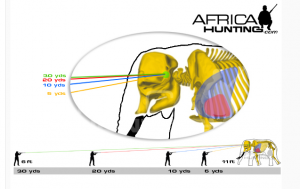
Paul Hendrickson (biographer of Ernest Hemingway) wrote a review on a 15-disc audio presentation of some of Hemingway’s writings that appeared in the May 19 issue of the New York Times Book Review (“An Audible Feast”, page 18). (With the clever illustration shown above by the great Ben Wiseman.) Hendrickson says that Hemingway, known as a robust outdoorsman, “was a far more tormented and sickly soul, both physically and emotionally, than we ever really guessed. In a way, he was a far more indoor soul as well.” To nail down the concept, Hendrickson offers a quotation by George Orwell (right):

A man ‘wears a mask, and his face grows to fit it,’ George Orwell wrote.
The Times, perhaps rightly, assumes that readers know such things, but I usually fall short. So I scurried for the source and the context of the thought-provoking Orwell quotation. I guess my main question was: To what kind of man does Orwell refer? Or is it generally applied?
The quote lies within Orwell’s 3,300-word essay “Shooting an Elephant,” which was first printed in the late 1930s. From the context, we see that Orwell refers to the “white man” (presumably British) who is trying to survive/live/lead/thrive/pretend as a “sahib” in Burma. He speaks with lots of authority here because he served in Burma as an imperial police officer in the 1920s. Here’s the passage that includes the quotation (with a little emphasis added):
I perceived in this moment that when the white man turns tyrant it is his own freedom that he destroys. He becomes a sort of hollow, posing dummy, the conventionalized figure of a sahib. For it is the condition of his rule that he shall spend his life in trying to impress the “natives,” and so in every crisis he has got to do what the “natives” expect of him. He wears a mask, and his face grows to fit it. I had got to shoot the elephant. I had committed myself to doing it when I sent for the rifle. A sahib has got to act like a sahib; he has got to appear resolute, to know his own mind and do definite things. To come all that way, rifle in hand, with two thousand people marching at my heels, and then to trail feebly away, having done nothing – no, that was impossible. The crowd would laugh at me. And my whole life, every white man’s life in the East, was one long struggle not to be laughed at.
Is the statement rightly applied here? Well it depends. If it implies that Hemingway felt outside pressures to wear the mask and then live up to it–at the expense of being true to himself–then, probably. But any concern for the proper handling of the quotation dissolved in the face of the essay. I loved reading it, happy that the review sent me there. I kept reading it, long past the “mask” quote. A key moment in Orwell’s tale came soon enough:
The rifle was a beautiful German thing with cross-hair sights. I did not then know that in shooting an elephant one would shoot to cut an imaginary bar running from ear-hole to ear-hole. I ought, therefore, as the elephant was sideways on, to have aimed straight at his ear-hole, actually I aimed several inches in front of this, thinking the brain would be further forward.
I don’t want to give much away but I will say it took a while for the elephant to die. Orwell’s character would have benefited from being able to whip out a smart phone before pulling out that “beautiful German thing.” He could have gone to this amazing site and seen this helpful diagram:


